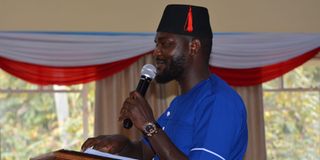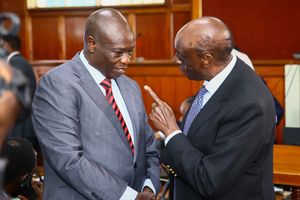How WhatsApp group messages inspired me to write a book

Father Atanasio Mwaniki Nyaga, author of the book "Appreciation of Poetry", during the book launch at Tangaza University in Nairobi on September 21, 2024.
Literature and poetry can be used as a mirror of society and can shape the ethics and character of the people by educating, entertaining and informing them.
Dr Muthomi Thiankolu who was the chief guest during the launch of a book titled "Appreciation of Poetry" authored by Fr Atanasio Mwaniki Nyaga at Tangaza University Karen said poetry can be used to communicate social ills in society. He added that he used poetry during the 2022 presidential election petition and moved the audience.
“I used poetry and literature quotes to argue my case in the Supreme Court and it worked for me.” Dr Muthomi Said.
He added that cosmic order and chaos are all aspects of poetic rhythm, metre rhyme and harmony.
In the book, Fr Mwaniki highlights many of the stylistic devices used in poetry and provides questions for each poem, making the book suitable for teaching poetry.
This is not a textbook designed with the teaching of poetry in mind. However, readers, poetry students and tutors will find the anthology invaluable in their interaction with poetry.
Fr Mwaniki says his book aims to simplify poetry by explaining the poetic devices and figures of speech used, providing tools for analysing the poems and making them accessible to readers and students.
"I called this book Appreciation of Poetry to challenge the traditional notion that poetry is difficult to understand," says Fr Mwaniki, adding that his inspiration comes from how society functions.
He said that three years ago he composed a poem and posted it on his WhatsApp group account and was surprised by the reactions of the members, most of which were positive. He then posted a second poem.
"The members kept asking me when the next poem was coming, and that's when I started thinking about putting together an anthology," he added.
As a Catholic priest, he says he has a busy schedule of apostolic work and study and has had to work extra hard to make time for his creative endeavours.
He says that he was determined to present in poetic form the ideas he had developed during his pastoral ministry. He says that his vocation as a priest leads him to create poetry for a just and moral society.
The panel consisted of eminent literary and music scholars. The moderators were Dr Emmanuel Shikuku from Kenyatta University, Father Emmanuel Ejike, a Nigerian scholar at CUEA and Ms Jerusha Kananu, an award-winning poet. At the event, Emmanuel Kimathi, a Grade Seven pupil at The Mustard Seed School shocked the audience with his deep understanding of the poetry.
The panellists concluded that the book was a reflection of the author’s experiences and observations about contemporary society and the modern challenges as well as aspects that have arisen in the digital age.
Ms Jerusha Kananu Marete said that to appreciate poetry, one must read it with an "inner eye", immersing oneself in the layers of meaning that poetry offers. She added that appreciation of poetry makes this easier for the reader as the author generously helps them to understand conventional techniques or poetry such as rhyme, rhythm, musicality and others.
She noted that poetry, far from being a marginal decoration to other things, is at the heart of human life, adding that poetry helps us to define and understand what it means to be human.
"Poetry expresses a concentrated imaginative awareness of experience with words carefully chosen for their sounds and for the images and ideas that suggest not just the obvious meaning," she said.
Father Mwaniki is the author of another book, a novel called Death in the Government House. In the novel, he explores issues of corruption, governance, democracy and other issues in the modern African setting.





